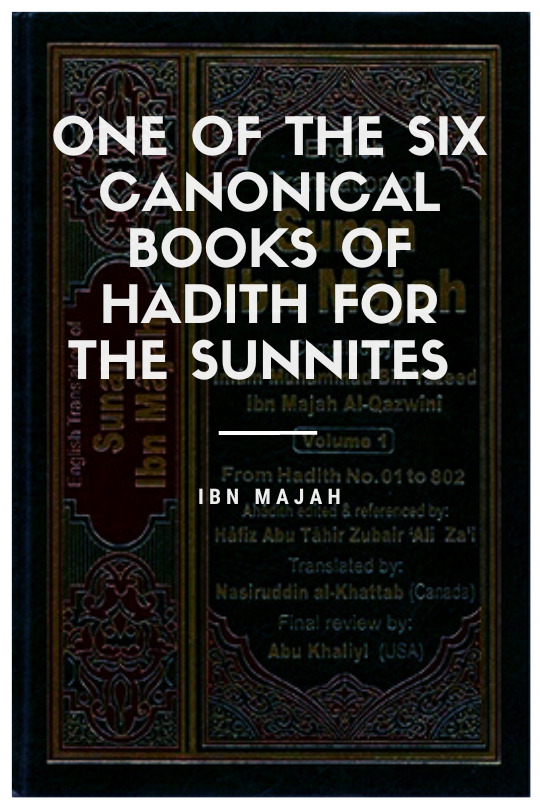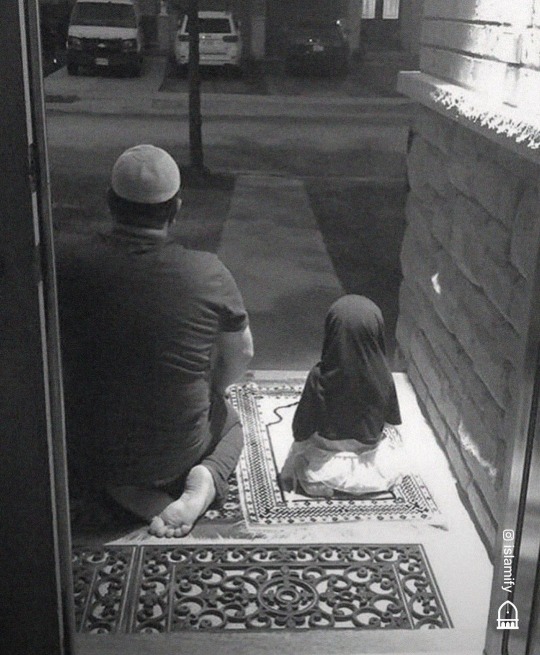#Ibn Majah
Text
Advice to One Who Feels Irredeemable After Major Sins
﷽
Did you know, sister? The Muslim is not allowed to despair in the mercy of Allah.
Indeed, no one despairs of relief from Allah except the disbelieving people.
—Qur'an (Yusuf) 12:87
As for suicide, you are correct. This is categorically forbidden.
And do not throw [yourselves] with your [own] hands into destruction.
—Qur'an (al-Baqarah) 2:195
So glad tidings to the believers, who know they have a merciful Lord who forgives them! :)
Say, "O My servants who have transgressed against themselves [by sinning], do not despair of the mercy of Allah. Indeed, Allah forgives all sins. Indeed, it is He who is the Forgiving, the Merciful.
—Qu'ran (az-Zumar) 39:53
I was listening to a lecture by a student of knowledge not too long ago and he mentioned something that I found amazing, regarding the devil's deception:
He is the one who, when it's time to commit a sin, whispers to you, "It's okay—we'll just repent for it later!"
However, once you've committed the sin, he pulls a pikachu face and makes you think, "Oh no, what have I done?! How will Allah ever forgive me for this disgusting act of transgression I've committed?! I can never be forgiven!"
And so in this way, he traps you into a mindset that ensures you will never turn to Allah and be forgiven, because you don't ask for it. SO many ayat and ahadith explain to us how Allah is only waiting for his slaves to turn to him. That is the only delay. Forgiveness is assured, the hold up is just in our turning to Allah.
And don't think for a second you're the only one who has gone through what you're going through, or sinned as you have. Indeed it is in human nature to sin, and the sins of desires are the easiest of all for us, because of the inclinations inherent in each of us.
With that said, just turn to Allah. :) It doesn't matter how ashamed you feel—in fact, it's good to feel regret since that helps to fuel a sincere repentance. But what makes you delay in seeking forgiveness? Do you think Allah doesn't already know what you've done? Of course he does. So repent to Him and show your sincerity in coming to the right path.
And this isn’t really me, I just feel that way because I feel so impure.
It is okay to feel regret; it is not okay to despair, or to feel that your mistakes define who you are. They do not.
Abu Huraira reported: The Messenger of Allah (ﷺ) said, “The adulterer is not a believer while he is committing adultery. The drinker of wine is not a believer while he is drinking wine. The thief is not a believer while he is stealing. The plunderer is not a believer while he is plundering and the people are looking to him.”
In another narration, the Prophet said, “And he is not a believer while he is killing.”
—Sahih al-Bukhari 2343, Sahih Muslim 57
I'm sharing this to draw your attention to the wording of the hadith, specifically (which I've emphasized for your benefit). While you were sinning, you may have been impure, yes, but you are not currently sinning, alhamdulillah. You are begging Allah for forgiveness, and this is something the believer does and the believer is pure.
Anas ibn Malik reported: The Prophet (ﷺ) said, "All of the children of Adam are sinners, and the best sinners are those who repent."
—Sunan al-Tirmidhi 2499
So the condition of the believer is like that.
It’s gotten to the point where salah isn’t even helping.
Another trick of the Shaiytaan. He hopes to distract you and cause you enough hopelessness that you turn away from Salah, which would be a greater sin than the one you're discussing in this post.
Let me repeat that: LEAVING OFF SALAH IS A GREATER SIN THAN ZINA.
'Abdullah bin Buraidah narrated that his father said: "The Messenger of Allah (ﷺ) said: 'The covenant that distinguishes between us and them is prayer; so whoever leaves it, he has committed Kufr.'"
—Sunan Ibn Majah 1079
Salah will help 100%, you just have to keep at it so Shaiytaan can see that his antics aren't working. Who is more truthful? Shaiytaan, the consummate liar and enemy of the believers, or Allah, The Most High?
"Verily, Salah restrains (oneself) from shameful and unjust deeds…"
—Qur'an (al-'Ankabut) 29:45
You went on to mention:
I just feel like I’ve failed as a Muslim and I’ve failed in life.
As mentioned above, the Muslim is the one who turns to Allah again and again. So do that. You are not your past. You are what you do about it. So turn to Allah and He will forgive you. We have countless ahadith and ayat about Allah forgiving MUCH worse than what you've done.
Even to Fir'aun, who is among the worst of the people in all of creation, who will be in the depths of the Hellfire, Allah sent his noble prophet Musa (alayhisalaam)—to do what?
"And speak to him with gentle speech that perhaps he may be reminded or fear [Allah]."
—Qur'an (Taha) 20:44
Subhanallah, a great Prophet was sent to Fir'aun so that he might repent for his sin of associating himself as a partner with Allah. And if Fir'aun had not been arrogant and accepted the message, begging Allah for forgiveness, Allah would have forgiven even him!
So give yourself a little perspective. It is not the end of the world. Yes, it's a major sin and you fell into it. Many, many, many people do. Upon us is to turn to Allah and ask for forgiveness with a sincere heart, to not return to the sin, and to busy ourselves with goodness instead.
And Allah knows best.
#0033#qur'an#Qur'an: Yusuf (12)#Qur'an: Al-Baqarah (2)#Qur'an: Az-Zumar (39)#Qur'an: Al-'Ankabut (29)#Qur'an: Taha (20)#hadith#Sahih Al-Bukhari#Sahih Muslim#at-Tirmidhi#Ibn Majah#repentance#sins
2 notes
·
View notes
Text
La sabiduría de Mahoma
0 notes
Text

Religious Studies Term Of The Day: Ibn Majah
1 note
·
View note
Text

11 notes
·
View notes
Text






It was narrated from Ibn Abbas that the Messenger of Allah(ﷺ) said: "There is no man whose two daughters reach the age of puberty and he treats them kindly for the time they are together, but they will gain him admittance to Paradise."
— Sunan Ibn Majah 3670
12 notes
·
View notes
Text

From Sunan Ibn Majah
2 notes
·
View notes
Text
Before Dajjal appears there will be three difficult years in which the people will suffer severe famine. In the first year, Allah will command the sky to withhold one third of its rain and the earth to withhold one third of its produce. In the second year, He will command the sky to withhold two thirds of its rain and the earth to withhold two-thirds of its produce. In the third year, he will command the sky to withhold all of its rain, and not a single drop will fall, and the earth to withhold all of its produce, and nothing will grow. All cloven-hoofed animals will die, except those that Allah wills...
Sunan Ibn Majah 4077
#hadith sahih#sunan ibn majah#hadith of the day#hadithoftheprophet#islamicblog#the last hour#judgement day#Muslim#Islam#fitnah#dajjal
10 notes
·
View notes
Text
'A'ishah (رضي الله عنها) narrated that: Allah's Messenger (ﷺ) said:
"Whoever innovates something in this matter of ours (i.e. Islam) that is not part of it, will have it rejected."
[Sunan ibn Majah 14 | Grade: Sahih]
3 notes
·
View notes
Text
“The reality of zuhd is the removal of the love of this world and the desire for it from the heart and [to instil] contempt for this world in the eyes of the servant. This should be such that the retreat of this world and the meagreness of its goods is more beloved to him than its approach and the ampleness of its goods. This is in so far as his internal state needs to be. Outwardly, the zahid needs to be removed from this world, hold himself distant from it as a matter of choice, whilst still able to have this world if he so chooses. He needs also to limit himself to the bare minimum with regard to all its conveniences, be it food, clothing, housing or other things. As he ﷺ said “Let the sufficiency of one of you from this world be no more than the rider's provision.”
Abd Allah bin ‘Alawi al-Haddad, Nasaih al-Diniyah
4 notes
·
View notes
Text
"Part of the perfection of one's Islam is his leaving that which does not concern him."
0 notes
Text
"We were sitting with the Prophet (ﷺ) when a man came to him whose clothes were intensely white and whose hair was intensely black; no signs of travel could be seen upon him, and none of us recognized him. He sat down facing the Prophet (ﷺ), with his knees touching his, and he put his hands on his thighs, and said: 'O Muhammad, what is Islam?' He said: 'To testify that none has the right to be worshipped but Allah, and that I am the Messenger of Allah, to establish regular prayer, to pay Zakat, to fast in Ramadan, and to perform Hajj to the House (the Ka'bah).' He said: 'You have spoken the truth.' We were amazed by him: He asked a question, then told him that he had spoken the truth. Then he said: 'O Muhammad, what is Iman faith? He said: 'To believe in Allah, His angels, His Messengers, His books, the Last day, and the Divine Decree (Qadar), both the good of it and the bad of it.' He said' You have spoken the truth.' We were amazed by him. He asked a question, then told him that he had spoken the truth. Then he said: 'O Muhammad, what is Ihsan (right action, goodness, sincerity)? He said: 'To worship Allah as if you see Him, for even though you do not see Him, He sees you.' He asked: "When will the Hour be?' He said: 'The one who is being asked about it does not know more than the one who is asking.' He asked: 'Then what are its signs?' he said: 'When the slave woman gives birth to her mistress' (Waki' said: This means when non-Arabs will give birth to Arabs") 'and when you see barefoot, naked, destitute shepherds competing in constructing tall buildings.' The Prophet (ﷺ) met me three days later and asked me: 'Do you know who that man was? I said" 'Allah and his Messenger know best.' He said: 'That was Jibril, who came to you to teach you your religion.”
Sunan Ibn Majah, book 1, Hadith 63
0 notes
Text
Questions About Women in Islam
﷽
Disclaimer: As always, I'd like to begin by clarifying that I am neither a scholar nor a student of knowledge. Most of what you've asked should be asked to a scholar. Luckily, similar inquiries have been made that I will try to pull from when sharing some general advice from what little knowledge I have. May Allah (swt) forgive and correct any mistakes I make.
---
The first thing we have to understand is: the male is not like the female1. Who tells us this? Our Creator, the One who made us, and who is more knowledgeable than He? Indeed, His Knowledge encompasses all things. Biologically, socially, emotionally, mentally—men and women are different.
Spiritually, however, men and women have equity before Allah (azawajal). In the Qur'an, Allah calls the believing men and women helpers/allies of one another, and reiterates the obligations of Islam upon them (equally on both)2. Islam repeatedly addresses the believing men and the believing women.
3 Evil Omens
Here is a slightly technical explanation of this narration, if you'd like to go in-depth.
The first thing to point out is that there is no such thing as bad omens in Islam and, indeed, to believe in them is Shirk. When blessings come to a person, it is only by the permission of Allah (سبحانه و تعالى) and when calamity strikes a person, it is likewise through the Decree of Allah (سبحانه و تعالى). So one should be grateful or patient, as the situation requires.
That said, if I didn't read the above article, I could look at the hadith and think, "Yea, sounds about right." Why? Because men chasing the dunya don't destroy themselves so easily on anything like they do a woman, accommodation, or a ride. These are things that are beautified for men, which often blind them.
It does not mean that women are a curse. Rather, Abdullah bin Amr narrated that:
the Messenger of Allah (ﷺ) said: "This world is but provisions, and there is no provision in this world better than a righteous wife.3"
So how can it be that women are an evil thing if they are also the best thing this world has to offer?
Majority of Hell
Women are not blamed for men going to hell, this is absolutely incorrect and erroneous thinking. The men who go astray will be held to account for what they do. And if what caused them to go astray was intentional deviation by a woman, she will be held to account for that.
As a recent modern example which springs to mind, in 2014 Michelle Carter sent a series of texts to her boyfriend Conrad Roy encouraging him to and insisting that he kill himself, which he did. She was convicted of manslaughter and sentenced to 15 months in jail (recently, she was just released early after completing 11 months with good behavior).
Did Carter kill Roy? No. Did she have a hand in his eventual, tragic demise? Yes, clearly.
Without looking at the hadith from a scholarly perspective (which I do encourage folks to do, if they can), it's plainly warning women against the power they have over men. Again, the woman is a colossal fitnah for men, because the desire for and love of women has been instilled in them, it is a part of the fitrah which is innate to men4.
Women Arranging Marriage
Historically speaking, the only women who gave themselves away in marriage or more generally, were available sexually by their own discretion (not to be confused with choice), were prostitutes or adulteresses.
In Islam, the woman always has access to a wali, and there is a clear delineation of who must take up the responsibility if her father passes away or is otherwise indisposed for the task. Meaning, in Islam, the woman is never left to her own devices, floundering in "the system" and being taken advantage of by any Tom, Dick, or Harry. Just like you cannot approach the Queen without going through her bodyguards and due process, first. Even if she is a homeless orphan, someone is there to check up on whatever guy is trying to move in on that.
Prostrating to Husbands
Sister, in the hadith itself, it forbids prostrating to the husband. Please reread it. "Were I to command" is not the same as "I command," and in fact, is a refutation itself. If your husband asks you to prostrate to him, check him into a mental facility and get some divorce paperwork going, aouthubillah, may Allah protect us from such disgusting scenarios.
Obedience & Marriage
The obedience to the husband is great, in Islam, and there is no denying this. That is because this is what Allah (سبحانه و تعالى) has commanded, and again, He is above all things knowledgeable.
Here is an important video that women struggling should watch. It's not overly techinical and easy to sit through; a casual conversation format that touches on many issues that modern women face due to the environments and fitan we've been raised in.
You are right that many Muslim men love to harp on about obedience, but in reality, most of them (the ones who are well-meaning), are doing this because they see the world around them in which the value of the man has been decimated and the laws of Allah (سبحانه و تعالى) are brushed aside in the interests of "progress". So they may have a fear of not being able to live according to Allah's commandments if they have a wife who prescribes to these ideas, because at the end of the day, the wife is not responsible for the husband, so his actions are not upon her but the husband is responsible for the wife, so her actions and deviations are his business. And again here we see the mercy Allah bestowed upon the woman, wherein she is not responsible for the man.
Rights and responsibilities are natural in any group environment, and marriage is no different. However, they never really come up as a point of contention until conflicts arise, so the rules and regulations are our guide on how these things should shake down. Is the relationship of husband and wife one of slave and master? Of course not. But can it be said the authority a man has over his house is one of a master? Absolutely. The same way a boss has the authority of a master over his employee, even though the employee is not technically a slave.
Now, how does an actual Islamic marriage look? Let's look at the Sunnah of the best man in all of creation:
Anas reported: The Messenger of Allah (ﷺ), had a Persian neighbour who would make good soup. He made some for the Prophet and then came to invite him. The Prophet said, “And this is my wife, A'ishah.” The man said no, so the Prophet said no. The man returned another time and invited him. The Prophet said, “And this is my wife.” The man said no, so the Prophet said no. Then, the man returned another time and invited him. The Prophet said, “And this is my wife.” The man said yes on the third time. The two left together until they arrived at the man’s house.
—Sahih Muslim 2037
In another hadith:
Al-Nawawi said, “The Prophet disliked attending a special meal without her, for this is among the beauties of married life, the rights of companionship, and the emphasized manners of gathering.”
—Sharh al-Nawawi ‘ala Sahih Muslim 2036
Still another hadith tells us:
It was narrated from Ibn Abbas that: "the Messenger of Allah said: 'There is nothing like marriage, for two who love one another.'"
—Sunan ibn Majah 1847
Discipline
Much of what's worth saying on the topic is covered in the video I linked above, but going back to what I mentioned in an earlier section, the one who has authority is the only one who can discipline, which is why you don't see a son able to discipline his mother, as he has no authority over her to do that. Likewise, as we established already, the authority within a marriage belongs to the husband. What that means is that if the husband deviates, the wife will not be held accountable for what he does and if his deviation is severe (involving religious matters), she can divorce him.
It is not possible for a husband to be rebellious, because there is no one (within the nuclear family structure) over him who he can rebel against.
The Muslim Family
Everyone reading this should do themselves a favor and watch this series: https://www.youtube.com/watch?v=UM5zIyCLlig&list=PL2dRQaGGWZOBYFF3KWlJALo5jkUBjkJnu
Watch it with your families, watch it yourselves, just watch it. It lays out the entire framework for how a muslim family unit is meant to work in an unprecedented way (in the English language).
Closing
I'm short on time here so I'll end it and just say, it's upon each of us to learn our religion properly from the correct sources. Those upon the haqq, who take their understanding from Qur'an and Sunnah with the understanding of the Salaf.
Learn who your Creator is so you can work on giving Him his rights. Once you understand the greatness and majesty of Allah, you will rush to submit to Him. Please keep in mind, brothers and sisters—this world is a prison for the believer and a paradise for the disbeliever5. We were not meant to make decisions that will further this short life but to look longterm.
Let's keep our eyes on the prize, inshallah.
As-salaam alaikum wa rahmatullahi wa barakatuhu.
Footnotes & References
1. Qur'an 3:36
2. Qur'an 9:71
3. Sunan Ibn Majah 1855
4. Sunan Ibn Majah 3998
5. Sahih Muslim 2956
#0015#Qur'an#Qur'an: Ali 'Imran (3)#Qur'an: At-Tawbah (9)#hadith#ibn Majah#Sahih Muslim#women#marriage
4 notes
·
View notes
Text
The Prophet ﷺ Said,
إِنَّ أَطْيَبَ مَا أَكَلَ الرَّجُلُ مِنْ كَسْبِهِ وَإِنَّ
The best (most pure) food a man consumes is that which he has earned himself.
Ibn Majah 2137
248 notes
·
View notes
Text
Quantity isn't as beloved to Allah as quality is. Thats why He made Surah al Ikhlas eqivalent to one third of the Quran. So this Ramadan, don't over burden youself with lots and lots of worship that tires you out and secretly makes you wish Ramadan was over. Pick one or two good deeds for extra worship and do them wholeheartedly, every day. Read a few pages of the Quran. Read the translation of a few ayahs. Pray two rakah of tahajjud. Give a few dollars in charity. Help your family. Be kind. No matter how "small" the deed is–Be sincere and consistent.
Abu Huraira reported: The Messenger of Allah ﷺ said, “Take up good deeds only as much as you are able, for the best deeds are those done regularly even if they are few.” [Ibn Majah]💌🌙
373 notes
·
View notes
Text

From Sunan Ibn Majah
0 notes
Text

عَنْ أَبِي هُرَيْرَةَ، عَنْ رَسُولِ اللَّهِ ـ صلى الله عليه وسلم ـ قَالَ: " إِذَا كَانَتْ أَوَّلُ لَيْلَةٍ مِنْ رَمَضَانَ صُفِّدَتِ الشَّيَاطِينُ وَمَرَدَةُ الْجِنِّ وَغُلِّقَتْ أَبْوَابُ النَّارِ فَلَمْ يُفْتَحْ مِنْهَا بَابٌ. وَفُتِحَتْ أَبْوَابُ الْجَنَّةِ فَلَمْ يُغْلَقْ مِنْهَا بَابٌ. وَنَادَى مُنَادٍ: يَا بَاغِيَ الْخَيْرِ أَقْبِلْ. وَيَا بَاغِيَ الشَّرِّ أَقْصِرْ. وَلِلَّهِ عُتَقَاءُ مِنَ النَّارِ. وَذَلِكَ فِي كُلِّ لَيْلَةٍ " . حديث صحيح - سنن ابن ماجة وجامع الترمذي - ١٦٤٢ - ٦٨٢
It was narrated from Abu Hurairah that the Messenger of Allah (peace be upon him) said: “When the first night of Ramadan comes, the satans and mischievous jinns are chained up, and the gates of the Fire are closed, and none of its gates are opened. The gates of Paradise are opened and none of its gates are closed. And a caller cries out: ‘O seeker of good, proceed, O seeker of evil, stop.’ And Allah has necks (people) whom He frees (from the Fire), and that happens every day.” Sunan Ibn Majah 1642 In-book reference : Book 7, Hadith 5 // Jami` at-Tirmidhi 682 In-book reference : Book 8, Hadith 1
وقد جاء التصريح في حديث رواه الإمام أحمد في مسنده بأن هذا المنادي ملَك من ملائكة الله وأنه يتكرر كلَّ ليلة حتى ينقضي الشهر ؛ قال رسول الله صلى الله عليه وسلم : ((.. وَيُنَادِي فِيهِ مَلَكٌ يَا بَاغِيَ الْخَيْرِ أَبْشِرْ يَا بَاغِيَ الشَّرِّ أَقْصِرْ حَتَّى يَنْقَضِيَ رَمَضَانُ))(2). ولئن كان أهل الإيمان لا يسمعون صوت هذا المنادي إلا أنهم من ندائه على يقين ؛ لأن الذي أخبر بذلك الصادق المصدوق صلوات الله وسلامه عليه الذي لا ينطق عن الهوى إن هو إلا وحي يوحى .
فلنستشعر في ليالي رمضان المباركات هذا النداء المبارك ، هذا النداء العظيم ، ولنفعِّل هذا النداء في حياتنا ، ولنتأمل في أحوالنا وسلوكنا ، ولننظر في حالنا من أي أهل النداءين ؟ فإنهما نداءان وكل منهما مقصود به فئة من الناس " يا باغي الخير .. يا باغي الشر " ؛ وفي هذا دلالة أن قلوب الناس على قلبين : قلب يبغي الخير ويطلبه ويبحث عنه ويتحراه ، وقلب آخر - والعياذ بالله - يبحث عن الشر ويتحرك في طلبه وينبعث في البحث عنه ، فليسوا سواء ؛ ليس من كان قلبه قلباً صالحاً مستقيماً يطلب الخير ويتحراه كمن قلبه -والعياذ بالله- قلباً شريراً لئيماً يبحث عن الشر ويتحراه .
فمن كان قلبه ذلك القلب الكريم الذي يتحرى الخير ويطلبه فليغنم شهر الخيرات : بالإقبال على الله ، وبالمزيد من الطاعات ، وبالاستكثار من العبادات ، وباغتنام موسم الخيرات بالإكثار من الرغائب والمستحبات ، وفي الحديث القدسي يقول الله جل وعلا : ((وَمَا تَقَرَّبَ إِلَيَّ عَبْدِي بِشَيْءٍ أَحَبَّ إِلَيَّ مِمَّا افْتَرَضْتُ عَلَيْهِ وَمَا يَزَالُ عَبْدِي يَتَقَرَّبُ إِلَيَّ بِالنَّوَافِلِ حَتَّى أُحِبَّهُ فَإِذَا أَحْبَبْتُهُ كُنْتُ سَمْعَهُ الَّذِي يَسْمَعُ بِهِ وَبَصَرَهُ الَّذِي يُبْصِرُ بِهِ وَيَدَهُ الَّتِي يَبْطِشُ بِهَا وَرِجْلَهُ الَّتِي يَمْشِي بِهَا وَإِنْ سَأَلَنِي لَأُعْطِيَنَّهُ وَلَئِنْ اسْتَعَاذَنِي لَأُعِيذَنَّهُ))(3) فالمقبِل على الخيرات يجتهد في الفرائض أولاً تبكيراً إليها ومزيد اهتمامٍ بها وسعياً في تتميمها وتكميلها ، ثم بعد ذلك يوسع في باب الرغائب والمستحبات اغتناماً واستكثارا .
وما من شك أن هذا النداء العظيم المتكرر كلَّ ليلة من ليالي رمضان يُعَدُّ حافزاً عظيماً للهمم والعزائم في شهر الخيرات ؛ ينادي المقبلين على الخيرات تحفيزاً لهم وشحذاً لهممهم لاستباق الخيرات ؛ سواء كانت متعلقة بالنفس كالمحافظة على الواجبات وأداء الصلاة والصيام وغيرها من الواجبات على أتم الوجوه وأفضلها والمنافسة في أداء النوافل والسنن واجتناب المحرمات والمكروهات ، أو كانت متعلقة بالغير كبذل النصيحة لهم وبر الوالدين وصلة الأرحام والإحسان إلى الجيران وسائر الناس ، وكالإنفاق في سبيل الله ومساعدة الفقراء والمحتاجين ، وكفّ الأذى عن الناس ومساعدتهم بالمال والبدن والجاه ....
فالثواب في هذا الشهر عظيم والأجر كبير وأبواب الخير واسعة فليضرب كل بسهم فيها والله تعالى يقول: {فَاسْتَبِقُوا الْخَيْرَاتِ} [البقرة:148] ، وإذا فعل ذلك فليخلص لله النية ولْيَحتسب الأجر عنده ولْيُداوم على ذلك ما استطاع ، وليحرص على اتباع النبي صلى الله عليه وسلم وموافقة هديه في كل أمر ، وليطلب العون من الله وحده على فعل الخيرات والمسابقة في أداء الطاعات والإكثار من الحسنات ، ومن الدعوات العظيمة التي علَّمها النبي صلى الله عليه وسلم أصحابه ولها نفع عظيم في هذا الباب ما رواه ابن ماجه عن عائشة رضي الله عنها ((أَنَّ رَسُولَ اللَّهِ صَلَّى اللَّهُ عَلَيْهِ وَسَلَّمَ عَلَّمَهَا هَذَا الدُّعَاءَ : اللَّهُمَّ إِنِّي أَسْأَلُكَ مِنْ الْخَيْرِ كُلِّهِ ؛ عَاجِلِهِ وَآجِلِهِ ، مَا عَلِمْتُ مِنْهُ وَمَا لَمْ أَعْلَمْ ، وَأَعُوذُ بِكَ مِنْ الشَّرِّ كُلِّهِ ؛ عَاجِلِهِ وَآجِلِهِ مَا عَلِمْتُ مِنْهُ وَمَا لَمْ أَعْلَمْ ، اللَّهُمَّ إِنِّي أَسْأَلُكَ مِنْ خَيْرِ مَا سَأَلَكَ عَبْدُكَ وَنَبِيُّكَ ، وَأَعُوذُ بِكَ مِنْ شَرِّ مَا عَاذَ بِهِ عَبْدُكَ وَنَبِيُّكَ ، اللَّهُمَّ إِنِّي أَسْأَلُكَ الْجَنَّةَ وَمَا قَرَّبَ إِلَيْهَا مِنْ قَوْلٍ أَوْ عَمَلٍ ، وَأَعُوذُ بِكَ مِنْ النَّارِ وَمَا قَرَّبَ إِلَيْهَا مِنْ قَوْلٍ أَوْ عَمَلٍ ، وَأَسْأَلُكَ أَنْ تَجْعَلَ كُلَّ قَضَاءٍ قَضَيْتَهُ لِي خَيْرًا))(9).
وفَّقنا الله جميعاً لفعل الخيرات واغتنام الأجور ورفيع الدرجات. مقال يَا بَاغِيَ الْخَيْرِ أَقْبِلْ للشيخ البدر
قال شيخ الإسلام ابن تيمية رحمه الله:
" وَمَا ذَاكَ إلَّا لِأَنَّهُ فِي شَهْرِ رَمَضَانَ تَنْبَعِثُ الْقُلُوبَ إلَى الْخَيْرِ وَالْأَعْمَالِ الصَّالِحَةِ الَّتِي بِهَا وَبِسَبَبِهَا تُفَتَّحُ أَبْوَابُ الْجَنَّةِ، وَيُمْتَنَعُ مِنْ الشُّرُورِ الَّتِي بِهَا تُفَتَّحُ أَبْوَابُ النَّارِ، وَتُصَفَّدُ الشَّيَاطِينُ فَلَا يَتَمَكَّنُونَ أَنْ يَعْمَلُوا مَا يَعْمَلُونَهُ فِي الْإِفْطَارِ؛ فَإِنَّ الْمُصَفَّدَ هُوَ الْمُقَيَّدُ، لِأَنَّهُمْ إنَّمَا يَتَمَكَّنُونَ مِنْ بَنِي آدَمَ بِسَبَبِ الشَّهَوَاتِ؛ فَإِذَا كَفُّوا عَنْ الشَّهَوَاتِ صُفِّدَتْ الشَّيَاطِينُ." انتهى من "مجموع الفتاوى" (14/167) .
وقال أيضا:
" وَلِهَذَا قَالَ النَّبِيُّ صَلَّى اللَّهُ عَلَيْهِ وَسَلَّمَ إذَا دَخَلَ رَمَضَانُ فُتِّحَتْ أَبْوَابُ الْجَنَّةِ وَغُلِّقَتْ أَبْوَابُ النَّارِ وَصُفِّدَتْ الشَّيَاطِينُ ؛ فَإِنَّ مَجَارِيَ الشَّيَاطِينِ، الَّذِي هُوَ الدَّمُ، ضَاقَتْ؛ وَإِذَا ضَاقَتْ انْبَعَثَتْ الْقُلُوبُ إلَى فِعْلِ الْخَيْرَاتِ، الَّتِي بِهَا تُفْتَحُ أَبْوَابُ الْجَنَّةِ، وَإِلَى تَرْكِ الْمُنْكَرَاتِ الَّتِي بِهَا تُفْتَحُ أَبْوَابُ النَّارِ، وَصُفِّدَتْ الشَّيَاطِينُ فَضَعُفَتْ قُوَّتُهُمْ وَعَمَلُهُمْ بِتَصْفِيدِهِمْ، فَلَمْ يَسْتَطِيعُوا أَنْ يَفْعَلُوا فِي شَهْرِ رَمَضَانَ مَا كَانُوا يَفْعَلُونَهُ فِي غَيْرِهِ، وَلَمْ يَقُلْ إنَّهُمْ قُتِلُوا وَلَا مَاتُوا؛ بَلْ قَالَ: " صُفِّدَتْ " وَالْمُصَفَّدُ مِنْ الشَّيَاطِينِ قَدْ يُؤْذِي، لَكِنَّ هَذَا أَقَلُّ وَأَضْعَفُ مِمَّا يَكُونُ فِي غَيْرِ رَمَضَانَ؛ فَهُوَ بِحَسَبِ كَمَالِ الصَّوْمِ وَنَقْصِهِ؛ فَمَنْ كَانَ صَوْمُهُ كَامِلًا: دَفَعَ الشَّيْطَانَ دَفْعًا لَا يَدْفَعُهُ دَفْعُ الصَّوْمِ النَّاقِصِ؛ فَهَذِهِ الْمُنَاسَبَةُ ظَاهِرَةٌ فِي مَنْعِ الصَّائِمِ مِنْ الْأَكْلِ." انتهى من "مجموع الفتاوى" (25/246) .
وقال الحافظ ابن حجر رحمه الله:
" وقيل: في هذا " إِشَارَة إِلَى رَفْعِ عُذْرِ الْمُكَلَّفِ، كَأَنَّهُ يُقَالُ لَهُ: قَدْ كُفَّتِ الشَّيَاطِينُ عَنْكَ؛ فَلَا تَعْتَلَّ بِهِمْ فِي تَرْكِ الطَّاعَةِ ولا فِعْلِ الْمَعْصِيَةِ " انتهى من " فتح الباري" لابن حجر (4/ 114). ... الحكمة من تصفيد الشياطين في رمضان مختصراً
Hadith Translation/ Explanation : English French Spanish Turkish Urdu Indonesian Bosnian Russian Bengali Chinese Persian Tagalog Indian Sinhalese Kurdish Hausa Portuguese: https://hadeethenc.com/en/browse/hadith/10107
#أحاديث نبوية#حديث#الرسول صلى الله عليه وسلم#رمضان#شهر رمضان#رمضان مبارك#رمضان كريم#شهر رمضان المبارك#رسول الله صلى الله عليه وسلم#sunnah#صلى الله عليه وسلم#النبي محمد صلى الله عليه و آله وسلم#اللهم صل وسلم على نبينا محمد#الجنة#النار#الشيطان#صفدت#شياطين#صوم#صيام#ادعيه اذكار تسبيح دعاء استغفار ايه صلاة صيام#حديث شريف#hadith#ahadeth#islam#hadeth#muslim#prophet muhammad#ramadan#ramadhan
96 notes
·
View notes